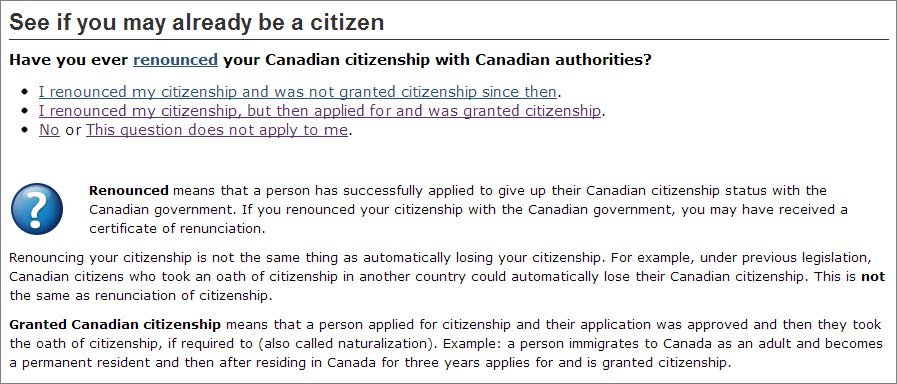An online job aid?
Sure–the essence of a job aid is not the form it takes, but that it provides guidance to someone who’s completing a particular task.
In that sense, many software wizards and widgets are job aids: they enable accomplishment that would be difficult or impossible without them.
I see this online guide from Citizenship and Immigration Canada (CIC) as a kind of decision table. (You might see it as a flowchart; the two formats are siblings.)
Most decision tables lead to a specific action–file this form, start that process. This one takes a different route. In a way, it’s a quick substitute for a conversation with a CIC official, the person who’d be making a decision about your status based on your answers to the question.
That’s one reason I’m putting it in the Ensampler: it shows that you can use the job aid approach to help the clients of an organization, as well as its employees.
About this job aid
As with most countries, citizenship in Canada can be complicated. On its website, CIC has information about applying for, getting proof of, and resuming citizenship. One part of the eligibility section is “See if you may already be a citizen.” That pace includes a tool–essentially, an online decision table “to determine if you are a citizen under Canada’s citizenship laws.”
Note that there’s a legal disclaimer on the page: the tool “is intended solely for general guidance and reference purposes.” In other words, even if the tool says you might be a Canadian citizen, some nuance or technicality can crop up.
What’s the accomplishment?
Determining whether you’re already a Canadian citizen. This could lead to additional actions, such as deciding to apply for a certificate of citizenship or a passport.
Who’s the performer?
A person who believes he or she might be a Canadian citizen–for example, someone like myself who was born in Canada but lost Canadian citizenship as a child when his parents became naturalized citizens of another country.
An example
Because the online tool is informational, you can try it out for yourself, but I’ll demonstrate the process using my own case. For example, this is the first question:
Have you ever renounced your Canadian citizenship with Canadian authorities?

Typically a job aid doesn’t explain why a step is performed. In this case, however, the online tool provides explanation for a technical term (renunciation) to help a person answer correctly.
In my case, the answer was “no.” That led to this sequence of questions (for which I won’t show all the screens; they’re like the example above):
Was your Canadian citizenship ever revoked for fraud?
No.
Where were you born?
In Canada.
When were you born?
Between January 1st, 1947, and February 14, 1977.
(These dates mark a period covered by the 1946 Canadian Citizenship Act.)
At the time of your birth, was either parent employed by a foreign government in Canada with diplomatic status?
No.
And the result:
Based on your answers, you are likely a Canadian citizen.
For a formal assessment of your citizenship status, you have the option of applying for proof of Canadian citizenship.
As CIC points out, for people who were born in Canada, an official birth certificate from their province or territory is often sufficient to prove citizenship. Those individuals, as well as people born outside of Canada, can also apply for a citizenship certificate.
Comments / critique
Citizenship is a complex issue. This online tool, which I see as a form of decision guide (though not strictly speaking a decision table), restricts itself to a single, easily-understood question: am I a Canadian citizen? What’s more, because of the many factors that may pertain, the best answer it produces is “likely so.”
When I answered some of the questions differently, this was the result:
Based on the information you provided, it appears that you are not a Canadian citizen.
That was followed by a list of seven possible reasons (e.g., “you are in the second or subsequent generation born outside Canada to a Canadian parent on or after April 17, 2009”).
So regardless of your citizenship status, the tool doesn’t pretend to give the ultimate decision; it simply explains what’s likely to be the case.

